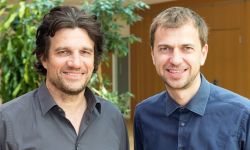
Wolfgang Lechner from the Institute for Quantum Optics and Quantum Information (IQOQI) and the Institute for Theoretical Physics at the University of Innsbruck will receive the prestigious START Prize for young scientists. Hanns-Christoph Nägerl from the Department of Experimental Physics will be granted the Wittgenstein Award, which is the most highly valued and most prestigious science award in Austria.
Today the Austrian Science Fund announced in Vienna: Wolfgang Lechner from the Institute for Theoretical Physics at the University of Innsbruck and the IQOQI of the Austrian Academy of Sciences will receive a START prize, which is endowed with up to 1.2 million Euros. The START Programme supports outstanding young researchers for the duration of up to six years. The Wittgenstein Award, valued at up to 1.5 million Euros and the most prestigious science award in Austria, will be given to Hanns-Christoph Nägerl from the Department of Experimental Physics at the University of Innsbruck.
Ultracold quantum matter
Hanns-Christoph Nägerl is one of the leading quantum physicists in the field of ultracold quantum many-body systems worldwide. He is renowned for his research on atomic quantum wires and molecular quantum gases whose temperature is close to absolute zero. In the laboratory Nägerl works on realizing quantum simulations based on laser-cooled atoms and molecules to elucidate complex many-body quantum processes. Some of these processes govern high-temperature superconductivity in condensed matter, whose origin remains unclear; facilitate or impede the electronic transport in electronic circuits of the future; or are important for the development of novel superfluids. The Wittgenstein Award will enable Hanns-Christoph Nägerl to bring his research on controlling many-body quantum systems to the next level. His goal is to detect individual molecules and their specific state in molecular quantum gases and, in a next step, to manipulate them individually. This research may result in applications in precision measurement technology and it may lead to answering the question whether fundamental physical constants are indeed constant.
Hanns-Christoph Nägerl, born in 1967, studied physics and mathematics in Göttingen, Germany, and San Diego, USA. He completed a doctorate in physics under the supervision of Professor Rainer Blatt in Göttingen and Innsbruck. After working as a post-doc at the California Institute of Technology (1998-2000) he wrote his habilitation under the supervision of Professor Rudolf Grimm in Innsbruck. In 2006 he became Associate Professor and since 2011 he has been Full Professor at the University of Innsbruck. For his academic achievements he received the START Prize, the Rudolf-Kaiser Prize and an ERC Consolidator Grant among others.
Quantum computers and artificial intelligence
Wolfgang Lechner’s research goal is to develop the theoretical foundations for a quantum computer that is capable of solving optimization problems efficiently. Optimization problems are widespread not only in science but also in everyday life. They range from finding the ground-state electron structure of molecules and protein folding to logistical problems in industries. A promising development is the notion that the learning of neural networks by artificial intelligence could be interpreted as optimization problem. Lechner‘s research focuses on a novel architecture for quantum computers, which he has developed with colleagues in Peter Zoller’s research group. This architecture will allow scientists to build a fully programmable quantum computer for quantum optimization. The physicists filed a patent for this concept and it has already drawn wide interest. With the funding by the START Programme, Lechner will apply this architecture for developing new approaches for using quantum computers for artificial intelligence.
Wolfgang Lechner, born in 1981, studied physics in Vienna completing his PhD under the supervision of Professor Christoph Dellago. After working as a researcher at the University of Amsterdam (2009-2011) he joined Peter Zoller’s Quantum Optics Theory Group at the Institute for Quantum Optics and Quantum Information of the Austrian Academy of Sciences. In 2016 he started a tenure track position for quantum research funded by investor Hermann Hauser at the University of Innsbruck.